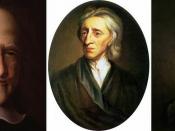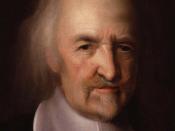"Where there is no common power, there is no law; where no law, no injustice. Force and fraud are the two cardinal virtues" (Hobbes Chpt. 13) Thomas Hobbes, a noteworthy political theorist and contemporary of John Locke, offers a concept of justice that is dependent upon the existence of a social structure which he calls the Commonwealth. The Commonwealth arises out of a state of war which he entitles the state of nature. In the state of nature, all men are equal, and thus, they have equal right to liberty. This equality of liberty is without external impediments insofar as how far one is able to extend his own liberty in the preservation of one's self. When men form societies under the social contract, a covenant which expresses their promise to curb their own ambitions and passions, their liberty, in order to work for the common good and to escape the violence that pervades the mere exercise of human nature, is also created.
They then, and only then, are able to define justice, which is only realized in the adherence to covenants, and covenants can only be established and adhered to within the Commonwealth. Outside of society, there are no guarantees for protection. Men live for themselves, and their passions ignite conflicts. It would be unreasonable to follow a covenant outside the Commonwealth as there are no bodies to enforce its terms.
.In the State of Nature, all men are equal and are equally able to threaten one another. From this equality arises an equality of hope in attaining their ends. What nature has not bestowed upon one man in brute strength, time bestows upon him in experience. The Right of Nature, according to Hobbes, is the liberty each person has to use their own power for their...


